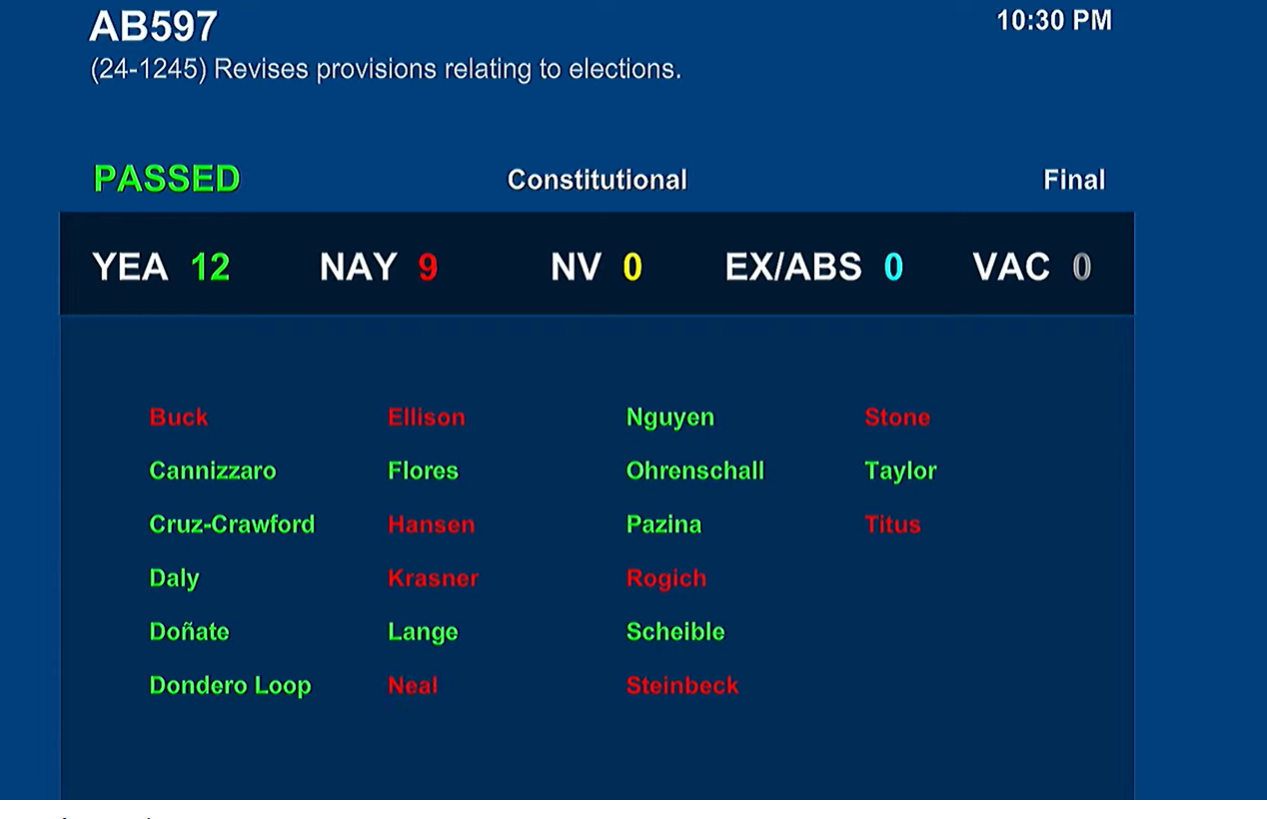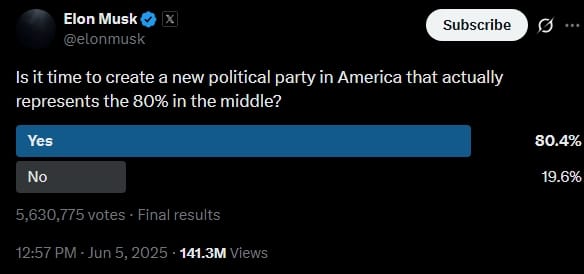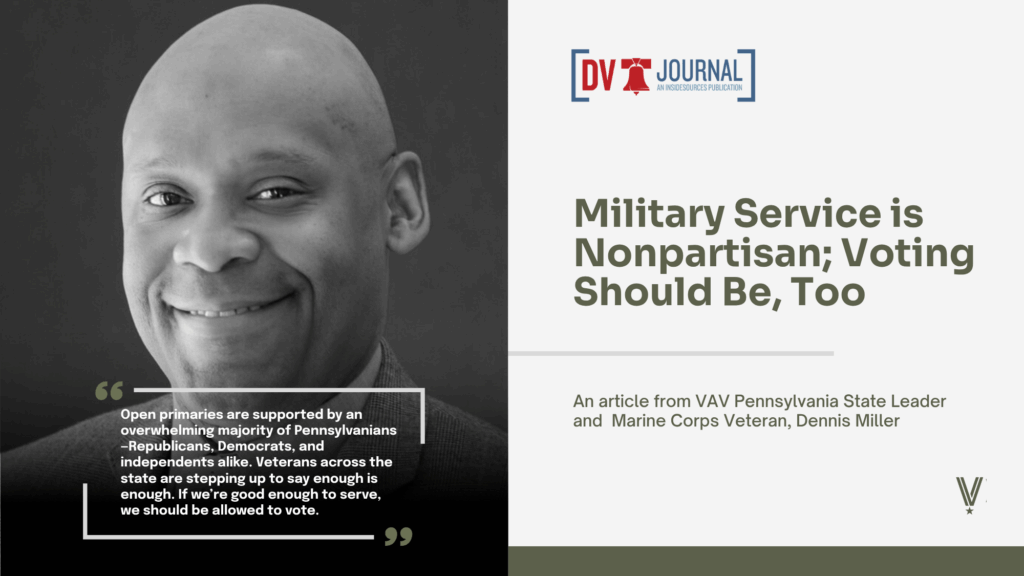2025 Has Already Been a Monumental Win for Independent Voters

We’re halfway into 2025 and the year has already delivered several wins for independent voters and their right to equal participation in elections following a campaign cycle in which statewide ballot measure losses threatened to slow down the movement.
But the 2024 election cycle didn’t kill reform. Instead – in the words of Open Primaries President John Opdycke – it revealed that “there are no quick fixes or short cuts.” In a letter sent out to his organization’s board and stakeholders, Opdycke added:
The polls show that 75% of Americans are with us on open primaries. But it is on us to create campaigns, initiatives and activities that earn people’s trust."
He normally sends out a report on the state of the open primaries movement at the end of every year, but so much has happened in May and June alone that it called for a mid-year report on developments from Nevada to NYC, Maryland to New Mexico, DC to Florida.
It all makes 2024 seem like a distant memory.
“We are gaining traction because we are doing the work, and because our message of fairness and inclusion makes sense to the vast majority of Americans - and the politicians know it,” he wrote.
The fact that 10,000 Americans leave the Democratic and Republican Parties every day to become independents is changing the conversation.”
The breakthroughs, updates, and victories for independent voters are not isolated to one part of the country. They are happening everywhere. Here is everything that has happened in the last month alone
Nevada Legislature Approves Bill to Give Independent Voters Real Choice in Elections
Opdycke noted that 2025 has taught reformers that breakthroughs can happen suddenly and unexpectedly, like a bill in Nevada for semi-open primaries that was approved by state lawmakers in the closing hours of the legislative session.

AB597, sponsored by Assembly Speaker Steve Yeager, kept partisan primaries, required that party members vote in their respective party’s primary, but gave independent voters – the state’s largest voting bloc – the option to pick between a Republican and Democratic ballot.
The introduction of the bill was a surprise to many reform advocates. Election reform under Question 3 failed at the ballot box in November. The measure included a nonpartisan, all-candidate primary that was open to all voters and candidates, regardless of party.
Yeager opposed the measure and while he said he did not object to the idea of open primaries (though he opposed the nonpartisan form in Question 3), he vowed not to bring up open primaries in the legislature following the November vote. And yet, he did.
While the bill was ultimately vetoed by Nevada Governor Joe Lombardo – it shows how much lawmakers (especially in states where independent voters outnumber both major political parties) are feeling the pressure to end independent voter suppression.
“Local activists Sondra Cosgrove and Doug Goodman began to pressure Yeager to do something, and to his credit, he did,” Opdycke said. He added that Yeager’s bill wasn’t perfect, but it was a step in the right direction.
Yeager even acknowledged this pressure when arguing for the bill. He said one way or another, primary reform would eventually come to Nevada. “The dam is going to break one way or another. The question is: Are we going to be part of the process?”
Big Change In the Big Apple? NYC Charter Commission Considers End to Closed Primaries
The New York Charter Revision Commission, a body convened annually by the mayor to consider reforms to city policy and place approved measures on the November ballot, could put the fate of city elections in voters’ hands.
The commission released a preliminary report on reforms it is considering for 2025 back in April. Among those reforms was changing the way primary elections work to allow the city’s 1.1 million independent voters to participate.
To put this in context, 1-in-5 registered New Yorkers are independent. It is the second-largest voting bloc behind registered Democrats. And yet, while these voters foot the bill for city primary elections – they are denied access to them.
The commission will weigh two main options:
- Using an open partisan primary system, which would allow unaffiliated voters to participate in either the Democratic or Republican primaries without needing to register with a party in advance -- which as of now is about 5 months in advance.
- Using nonpartisan primary elections, something most cities in the US already use. All candidates and voters (regardless of party affiliation) participate on a single primary ballot. The top vote-getters (whether it is 2, 3, 4, or 5) would then advance to the general election.
New York independents have lined up to demand equal voting rights. The commission will hold public hearings throughout the city until its final hearing in Harlem on July 9. Dozens of independent voters have already shown up to testify.
“We’re working closely with the Charter Revision Commission in NYC to convince them to place a measure on the November ballot,” Opdycke said.
Clinton Praises California ‘Top Two,’ While World’s Richest Man Talks Up More Choice
It speaks volumes about where the election reform movement and the growth of independent voters in the US are at that a former President of the United States, considered an established figure and leader of their party, praises nonpartisan election reform.
Former President Bill Clinton called California’s nonpartisan top two primary system, authored by the Independent Voter Project and approved by voters in 2010, a “much more sensible” election system on ABC’s The View.
He noted that candidates don’t always have to feel like they are in the thrall of their party under a system that is open to all voters and candidates.
At the same time, Elon Musk – who campaigned with Donald Trump in 2024 and headed Trump’s Department of Government Efficiency – polled X users on June 5 with the question: “Is it time to create a new political party in America that actually represents the 80% in the middle?”

The implication of the post is that neither the Democratic Party nor the Republican Party adequately represent the vast majority of Americans. It had more than 141 million views and over 5.63 million responses.
While Musk posted the poll during his public spat with the president, it elevated the broad public desire for more choice in elections into the public spotlight with articles featured in the New York Times, Newsweek, Politico, and CBS News.
A Party in Crisis: Florida Democrats Consider Opening Their Primaries
“Here’s the issue: the Democratic Party in Florida is dead.” These were the words of Florida lawmaker Jason Pizzo, who changed his party registration from Democrat to independent and resigned his position as Senate minority leader.
While state Republicans have faced their own internal conflicts in recent months, the Democratic Party is in a tough position: Their political brand has weakened significantly with Florida voters.
And now, in an effort to save the party, its leadership and top officials are considering opening their primaries to independent voters.
Florida is a closed primary state, meaning only registered Republicans and Democrats can vote in the first stage of the taxpayer-funded elections process. There is one exception: If an election only has candidates from one party running, all voters can participate in the primary.
This rarely happens in Florida because even in districts that are so safe for one party that the other would normally not field a candidate, the majority party will prop up a “write-in” candidate that won’t actually campaign.
The sole purpose of these candidates is to prevent a Universal Primary Contest which would give more than the only party running candidates a say in who wins the election. They have colloquially become known as “phantom candidates.”
The Florida Democratic Party, however, has realized that their very political survival means they cannot take the nearly 3.5 million registered independent voters in Florida for granted. Its chair, Nikki Fried, confirmed the party is looking into opening its primaries.
“Those are conversations we are having,” she said. “There’s a lot of people who are in the middle that are typically part of our coalition,” noting that men of color and young voters are registering as independents in greater numbers.
Open Primaries President John Opdycke and Senior Vice President Jeremy Gruber penned an editorial in the Orlando Sentinel taking party leaders to task and asking them if they are serious about expanding outreach to independent voters.
Lawsuit Challenges Constitutionality of Closed Primaries in Maryland
The Open Primaries Education Fund says Maryland can’t continue to call itself a democracy if it shuts out independent voters from taxpayer-funded and publicly administered elections.
The organization filed a lawsuit on May 28, asserting that Maryland is violating its own constitution and the voting rights of nearly 1 million independent voters by using closed primary elections that restrict access to party members.
The lawsuit was filed on behalf of 5 registered unaffiliated voters, one of whom said:
I would like to have candidates consider and appeal to my concerns and values, but they tend to dismiss me unless I affiliate with their party so I can vote in the primaries. That's just not right.”
Plaintiffs cite multiple provisions of the Maryland Constitution that they claim are violated by the use of closed primaries, including a provision they say guarantees all registered voters the right to vote in “all elections held in this State.”
They also object to the state spending public money on elections that exclude a large segment of taxpayers.
“We are not seeking to force political parties to let independents vote in their primaries,” said former Maryland Lt. Governor Boyd K. Rutherford. “We are asking the State to stop using taxpayer dollars to fund an exclusionary process that denies basic voting rights.”
On top of being first reported on IVN, the lawsuit made headlines in major national newspapers like the Washington Post, Baltimore Sun, and the Washington Examiner.
Pennsylvania Is Inching Closer to Open Primary Reform
“I’m not asking for a whole lot. I just want to vote,” said Dennis Miller, leader of Pennsylvania Veterans for All Voters.

Miller is one of several veterans and among the approximately 1.4 million voters in Pennsylvania who are denied access to taxpayer-funded primary elections because they are registered unaffiliated.
And these voters demand change.
Pennsylvania is one of a shrinking number of states that use closed primaries. However, each year, thanks to the committed effort of groups like Ballot PA, it steps closer and closer to open primary reform.
“There are 1.4 million independent voters in Pennsylvania that cannot participate in these elections, and we think that’s unfair, and it’s wrong and damaging to the process,” said David Thornburgh, the chair of the Ballot PA Campaign to End Closed Primaries.
Just ask reformers in New Mexico, the key is patience and dedication. Rome wasn’t built in a day, and sometimes – neither are better elections. Advocates for open primaries have voters’ attention, they have the media’s attention, and they have gotten lawmakers’ attention as well.
The latest legislative session saw the introduction of House Bill 280, authored by state Reps. Jared Solomon and Chris Rabb, which would enact semi-open primary elections that allow independent voters to pick between a Republican and Democratic primary ballot.
And, just to clear up any concerns of nonmembers choosing party leaders – the bill explicitly states that independent voters can vote for public officials but not in elections for party leadership.
Rabb said:
There should be no second class among Pennsylvania’s electorate. Over 1 million voters are unduly disenfranchised in our state because they have chosen to exercise their right to remain unaffiliated with our restrictive political duopoly.”
Solomon and Rabb are both Democrats, but that does not mean there isn’t growing bipartisan demand for open primary reform. State Senator Dan Laughlin, a Republican, has sponsored his own open primaries legislation on the Senate side.
In Congress, Republican US Rep. Brian Fitzpatrick of Pennsylvania is among a bipartisan coalition that has introduced a bill that would require all states to use open primaries for federal elections or lose federal funds.
And Of Course, We Can’t Leave Out The Biggest Win for Independents in 2025 So Far…
Nevada lawmakers are feeling the pressure. Pennsylvania is getting closer to ending closed primaries. But there is one state that kicked off the resurgence of momentum independent voters have seen in 2025 by actually doing it… New Mexico.
In April, New Mexico Governor Michelle Lujan Grisham signed SB 16 into law, which requires registered party members to vote in their respective party’s primary, but for the first time gives more than 330,000 independent voters the option to pick a party’s ballot.
To call primary elections the most important stage of the electoral process is an understatement. According to Unite America, 83% of New Mexico’s state house races in 2024 were effectively decided in the primaries due to a lack of competitiveness in the districts.
What’s worse is about half of these seats go uncontested every election cycle. So, if you were not a registered member of the majority party in one of these districts – you had zero say in who represented you.
With the stroke of a pen, this all changed for future elections starting in 2026.
This victory wasn’t an easy one. Calls for primary reform go back decades as roughly a quarter of the state’s voting population was locked out, despite paying for these elections. It wasn’t until 2015 that efforts really kicked off with the creation of New Mexico Open Elections.
With the help of national partners like Open Primaries and Unite America, NMOE focused its messaging on 2 things:
- Taxpayer Fairness – If elections are publicly funded, all voters should be allowed to participate.
- Democratic Integrity – Excluding independent voters undermines the legitimacy of elections and fuels political disengagement.
In the end, it took 10 years to finally break through with lawmakers.
During this time, several leaders emerged to carry the torch for open primary reform, including former State Rep. Bob Perls (who founded NMOE), independent candidate Jarratt Applewhite, and Sila Avcil (who is now the head of NMOE).
Open Primaries published a report on the journey reformers went through in New Mexico, in which they noted several key takeaways for future reform campaigns to construct their own roadmap to success.
Their key findings:
- Build Local Capacity First: NMOE was a homegrown movement that established connections with local communities.
- Choose the Right Policy at the Right Time: In states where reform relies on legislative action, reformers have to be willing to take the small steps toward their end goals.
- Use Public Funds as a Leverage Point: Taxpayers pay for these elections. Why are they denied access to them?
- Engage Allies Across the Political Spectrum and Across Communities: NMOE could not have been successful without the help of Democrats, Republicans, and independents from communities across New Mexico.
- Prioritize Independent Voter Engagement and Storytelling: Let the disenfranchised tell their story through testimonials and in legislative hearings.
- Prepare for Resistance and Play the Long Game: Those who benefit from keeping independent voters shut out of elections will do everything they can to preserve the status quo. As in Nevada, Pennsylvania, and New Mexico, change will take time.
Open primaries reform has also opened the door for other initiatives. Perls, who was there at the start of the reform effort, is now focused on building a New Mexico chapter of the Forward Party to give voters more choice.
Specifically, a choice that is focused on greater accountability, stronger competition and better elections.
“I know that we are years away from being able to pass the next steps in democracy reform here in New Mexico, but we have taken the first step by ending our closed primary system. But make no mistake there have to be next steps,” he wrote.
 Shawn Griffiths
Shawn Griffiths







